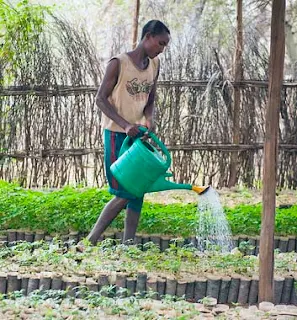Somalia Bananas and Warlords
In Somalia up until 1990, before warlords, insecurity, drought and poor infrastructure over 20 years has led to a collapse of Somali banana industry.
 |
| Watering banana seedlings. |
Before the beginning of the reign of terror of Somali civil war and drought; Somalia was the largest banana exporter in Eastern Africa. The banana industry was vital in Somalia with exports mainly to Italy and Middle Eastern markets. Somalia is closer to Middle Eastern main ports and can thus provide fresher bananas at lower transport cost than bananas from other countries.
In the midst of one of the world’s worst humanitarian crises, the banana offered a small glimmer of hope for Somalis trying to reclaim economic harmony. Due to the civil war, warlords, poor roads and storage facilities, which result in much spoilage and high prices far from producing areas, hunger and malnutrition were some of the major causes of suffering for significant sections of the population.
Before the civil war, almost all banana agriculture industries were owned or profoundly controlled by the Somali government. All of them were destroyed soon after the start of the civil war. The Juba riverbanks before the civil war had large thriving banana plantations; however, since the onset of the civil war farms have been abandoned. The lower Shabelle riverbanks in southern and central Somalia were the most productive area for bananas, maize, and sesame before the civil war.
 |
| Banana Tree |
The Somali Warlord Mohamad Farrah Aidid set up a scheme between the banana farmers and an Italian Fruit Company guaranteeing protection from violence, raiding, rape and other threats posed by his followers and other clan warlords for a percentage of the profits.
Aidid felt he was not being paid enough by the banana farmers as well as Italian Fruit Company therefore his followers fired upon ships who came twice a month to pick up the banana cargo. This was a devastating loss for the banana farmers who lost their emerging livelihoods and had to depend on foreign aid instead of growing their own cash crops in exchange for an income. The money from growing bananas could have been sold to buy food that was needed such as beans and corn.
Foreign aid raised the perilous living standards by proving basic needs such as donated food but has no part in creating a strong workforce, and growing Somalia’s economy. Somali warlords decimated the workforce, from farmers to teachers to civic leaders and in 2011 famine was declared in two regions of southern Somalia in the southern Bakool and Lower Shabelle regions.
The hardworking banana farmer became one of millions of victims during the Somali civil war tug-of-war between rival warlords. There is something special about the gift of food and banana agriculture was an important part of the cycle of life as farming knowledge was once passed down from generation to generation. Somali banana farmers were stewards of the land, with huge potential to restore damaged ecosystems by employing sustainable and regenerative agricultural practices.
Banana farming was a huge benefit to the local economy and provided a sense of proud wellbeing of being able to support family and community alike. With many mouths to feed, banana farming may well have been the most important job in local Somali communities during the civil war.
Earning money was a means that enabled the Somali banana farmer to protect his family, to build a better life, and to give back to the community. In some ways despite warlords and the AK47, banana farmers could have controled their own destiny by placing hands in Somali soil and cultivating a crop that could have help the family relocate to a safe place.



